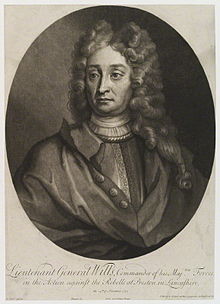Sir Charles Wills | |
|---|---|
 Sir Charles Wills | |
| Member of Parliament for Totnes | |
| In office December 1718 – December 1741 | |
| Lieutenant-General of the Ordnance | |
| In office April 1718 – December 1741 † | |
| Governor of Portsmouth | |
| In office 1718–1719 | |
| Governor of Berwick-upon-Tweed | |
| In office 1715–1718 | |
| Personal details | |
| Born | Charles Wills 1666 St Goran, Cornwall |
| Died | 25 December 1741 (aged 75) London |
| Resting place | Westminster Abbey |
| Nationality | English |
| Political party | Whig |
| Occupation | Soldier and politician |
| Awards | Privy Councillor 1719 Order of the Bath 1725 |
| Military service | |
| Allegiance | |
| Years of service | 1689–1741 |
| Rank | General |
| Unit | Colonel, 30th Foot 1705–1716; Buffs, 1716–1725; Grenadier Guards 1726–1741 |
| Battles/wars | Williamite War in Ireland The Boyne; Aughrim Nine Years' War Landen Namur 1695 War of the Spanish Succession Cádiz; Guadeloupe; Barcelona; Cagliari; Almenar; Saragossa; Brihuega Jacobite rising of 1715 Preston |
General Sir Charles Wills KB PC (October 1666 – 25 December 1741) was a British Army officer and politician who served as Lieutenant-General of the Ordnance from 1718 to 1741. He also sat in the British House of Commons from 1718 to 1741, representing the constituency of Totnes.
He began his military career in 1689, serving successively in the Williamite War in Ireland, the Nine Years War and the War of the Spanish Succession. During the Jacobite rising of 1715, he commanded government troops at the Battle of Preston, which ended the rising in England.
Wills was rewarded with promotion to lieutenant-general and returned for Totnes, a seat controlled by the Duke of Bolton, a prominent Whig. Despite making little impact on Parliament, he was a reliable supporter of the government and appointed Privy Councillor in 1719.
George I made him one of the first members of the newly revived Order of the Bath in 1725, but Wills failed to gain a peerage as expected. He died in London on 25 December 1741 and was buried in Westminster Abbey.